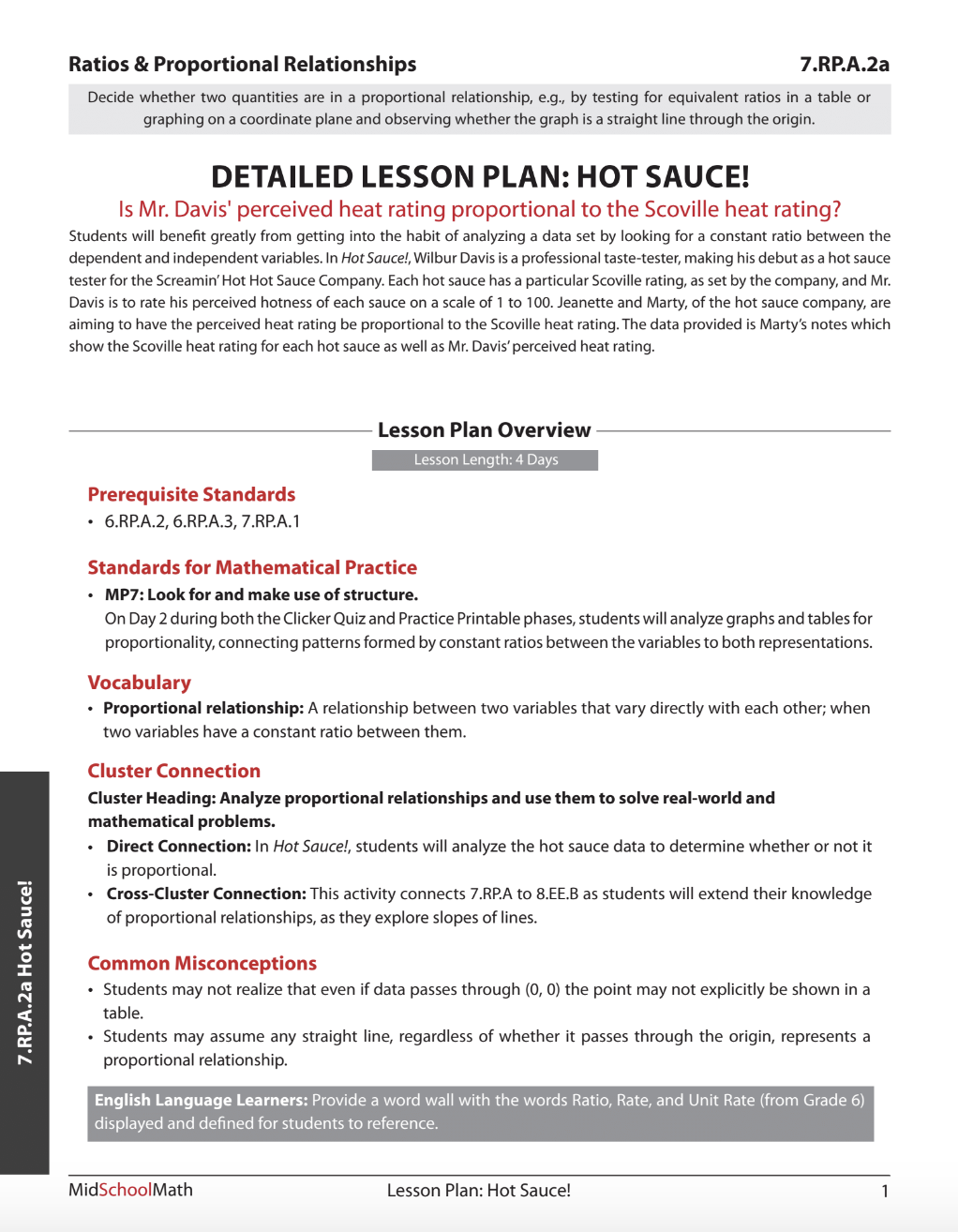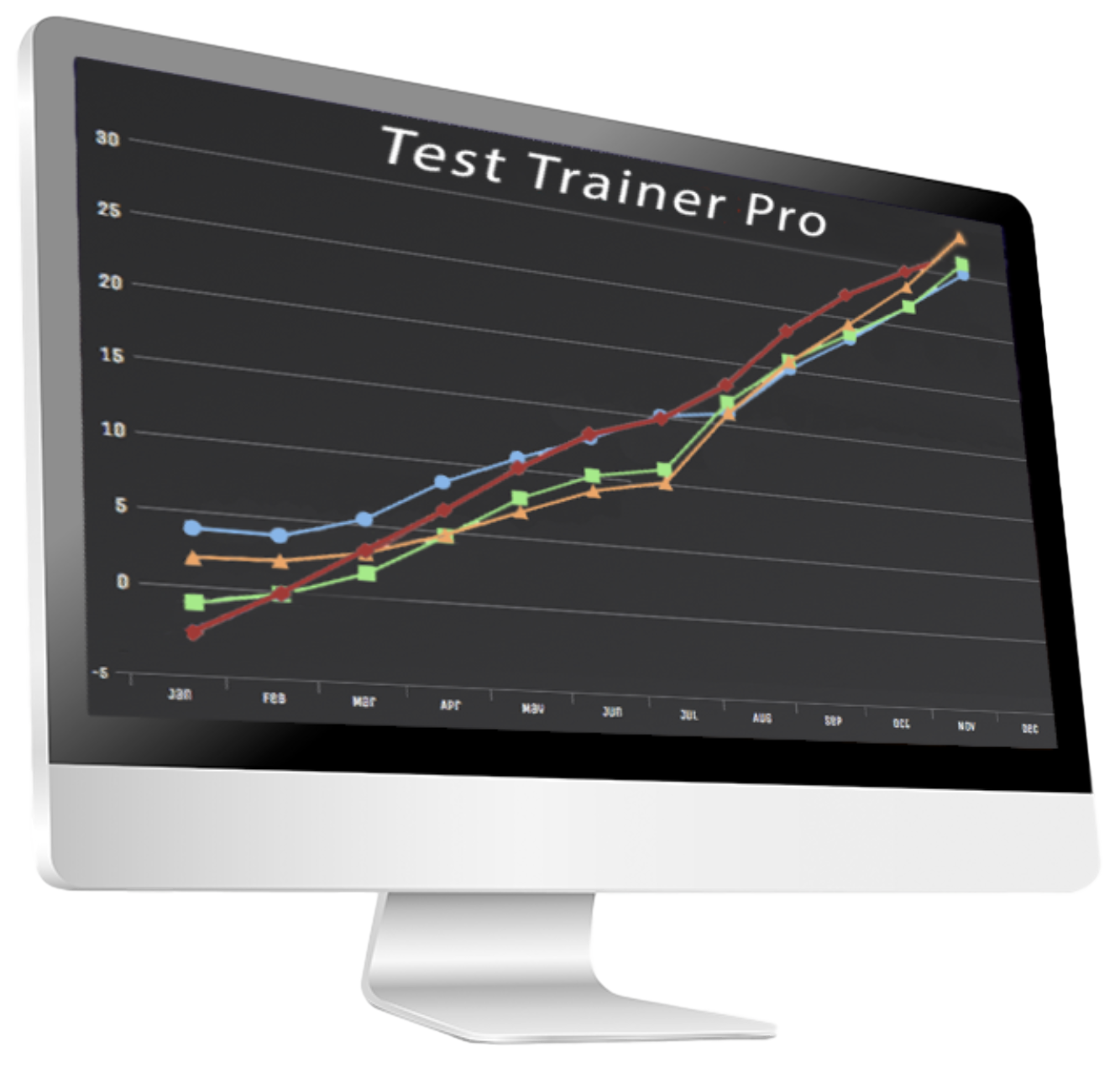Grade 7 Sample Lesson
Ratios & Proportional Relationships - 7.RP.A.2a
Start by downloading the
Decide whether two quantities are in a proportional relationship, e.g., by testing for equivalent ratios in a table or graphing on a coordinate plane and observing whether the graph is a straight line through the origin.
LESSON: HOT SAUCE!
Is Mr. Davis' perceived heat rating proportional to the Scoville heat rating?
Students will benefit greatly from getting into the habit of analyzing a data set by looking for a constant ratio between the dependent and independent variables. In Hot Sauce!, Wilbur Davis is a professional taste-tester, making his debut as a hot sauce tester for the Screamin' Hot Hot Sauce Company. Each hot sauce has a particular Scoville rating, as set by the company, and Mr. Davis is to rate his perceived hotness of each sauce on a scale of 1 to 100. Jeanette and Marty, of the hot sauce company, are aiming to have the perceived heat rating be proportional to the Scoville heat rating. The data provided is Marty's notes which show the Scoville heat rating for each hot sauce as well as Mr. Davis' perceived heat rating.
Day 1
Test Trainer Pro
7 to 10 minutes
Students use this adaptive tool at the beginning of class, for 7-10 minutes, rotating through different domains each day. They experience a series of math problems, exposing them to a variety of math skills. Both students and teachers can track student progress throughout the year.
Test Trainer Pro is not included in this sample lesson. For a 30-day trial of the complete toolset, including Test Trainer Pro, contact us at info@midschoolmath.com.
The Math Simulator
40 to 50 minutes
1.Immersion
Play Immersion video, whole-class.
Restate the question: Is Mr. Davis' perceived heat rating proportional to the Scoville heat rating?
Facilitate classroom discussion; ask students: "What do we need to know?"
2.Data & Computation
Print and copy the Data Artifact and distribute to students.
Allow students work time. Answer their questions with other questions to push their thinking. Ask students: "Does your answer make sense?" Withhold confirmation of the answer.
Consider using a sharing protocol leading to mathematical insights and/or highlighting misconceptions.
Allow students to revise their work.
3.Resolution
Play Resolution video, whole-class.
Answer: Mr. Davis' perceived heat rating is not proportional to the Scoville rating.
Have students compare their strategy to that shown in the video.
Teacher Instruction
8 to 10 minutes
Deliver a brief, clear lecture using your preferred method (Interactive white-board/Slide Deck/Whiteboard).
The Teacher Instruction part of the Detailed Lesson Plan includes statements you might make, images you might show and examples you might want to use. Please customize it to your needs and to the needs of your students.
The lecture should:
Connect to The Math Simulator story as often as possible
Bridge student strategies to the actual math of the standard
Formalize the math of the standard
Introduce other parts of the standard not included in The Math Simulator components
Day 2
Test Trainer Pro
7 to 10 minutes
Students use this adaptive tool at the beginning of class, for 7-10 minutes, rotating through different domains each day. They experience a series of math problems, exposing them to a variety of math skills. Both students and teachers can track student progress throughout the year.
Test Trainer Pro is not included in this sample lesson. For a 30-day trial of the complete toolset, including Test Trainer Pro, contact us at info@midschoolmath.com.
Simulation Trainer
20 to 40 minutes
Students should be prepared with pencil, paper and headphones.
Tell them their goal is to correctly answer a series of questions all in a row to earn green dots. They are also tasked with teaching their classmates so that EVERYONE earns their green dots.
Instruct students to navigate to bit.ly/7RPA2A-Sim and click BEGIN. Work to completion or until time runs out.
Data for this component will not be saved for you or your students in this Sample Mode. For a 30-day trial of the complete toolset, contact us at info@midschoolmath.com.
Practice Printable
8 to 10 minutes
If time permits:
Print and copy the Practice Printable and distribute to students.
Have students begin to work on the front page.
Options for use:
Exit/Entry ticket
Differentiation & grouping for Day 3
Day 3
Test Trainer Pro
7 to 10 minutes
Students use this adaptive tool at the beginning of class, for 7-10 minutes, rotating through different domains each day. They experience a series of math problems, exposing them to a variety of math skills. Both students and teachers can track student progress throughout the year.
Test Trainer Pro is not included in this sample lesson. For a 30-day trial of the complete toolset, including Test Trainer Pro, contact us at info@midschoolmath.com.
Practice Printable & Tutorial
10 to 20 minutes
Play Tutorial Video, whole-class, to show a worked example from the Practice Printable.
Group students if desired, based on Exit Ticket or previous day's work.
Have students continue their work on the Practice Printable.
Options for use:
Exit/Entry ticket
Differentiation & grouping
Stations
Homework
Consider using protocols that promote student collaboration and discourse.
Example: I Wonder, I Notice (8-10 min): Following a completed whole-class assignment, set ground rules for peer critique, including being thoughtful, specific, and helpful (≈1 min). Choose a student to be "the originator" who is tasked to explain his or her approach and solution to a problem (≈2 min), while other students listen only. Then ask other students to ask "the originator" clarifying questions or comments that start with 'I wonder' and 'I notice' (≈5-6 min).
Student Reflection
30 to 40 minutes
Students should be prepared with colored pencils and white paper.
Print and copy the Student Reflection Rubric and distribute to students.
Instruct students to use the rubric to begin creating a personal reflection based this sample lesson. If time is limited, this task may need to be completed outside of class.
Hang completed reflections in your classroom or in the hallway.
Day 4
Test Trainer Pro
7 to 10 minutes
Students use this adaptive tool at the beginning of class, for 7-10 minutes, rotating through different domains each day. They experience a series of math problems, exposing them to a variety of math skills. Both students and teachers can track student progress throughout the year.
Test Trainer Pro is not included in this sample lesson. For a 30-day trial of the complete toolset, including Test Trainer Pro, contact us at info@midschoolmath.com.
Clicker Quiz
Approx. 40 minutes
Teacher should:
Launch the Clicker Quiz and project, whole-class.
Students should:
Be prepared with pencil and paper
Access the Virtual Clicker at http://bit.ly/MyClicker
Enter the Quiz Code on the Virtual Clicker
Students will vote on each question and should be given opportunities to discuss strategies and answers together on most questions.
Based on the class distribution for each question, consider:
Giving a mini-lesson
Highlighting misconceptions
Allowing students to explain to other students
Celebrate successes!

















